2007届英语高考第二轮复习资料---代词-新人教[上学期]
文档属性
| 名称 | 2007届英语高考第二轮复习资料---代词-新人教[上学期] |
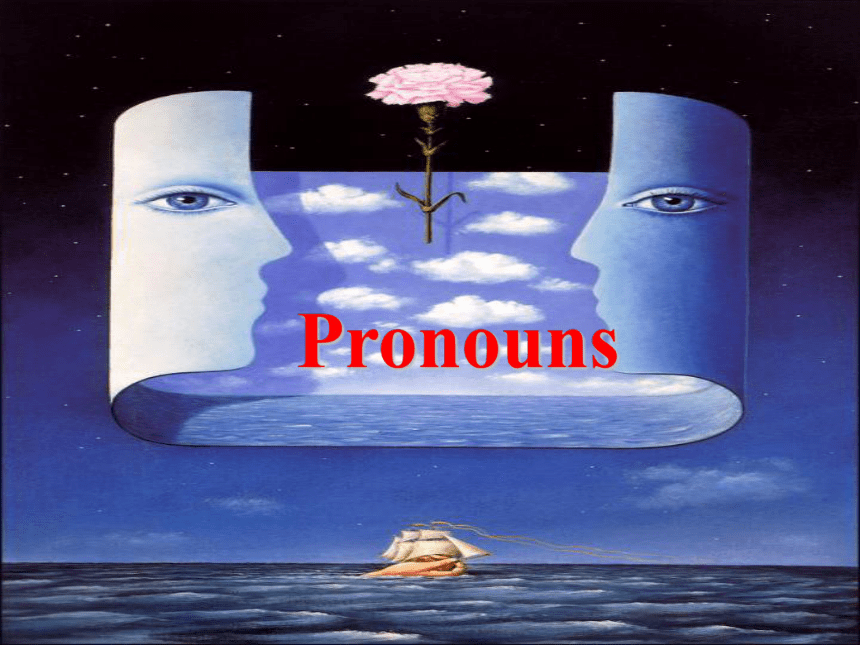
|
|
| 格式 | rar | ||
| 文件大小 | 156.0KB | ||
| 资源类型 | 教案 | ||
| 版本资源 | 通用版 | ||
| 科目 | 英语 | ||
| 更新时间 | 2007-01-19 00:00:00 | ||
图片预览

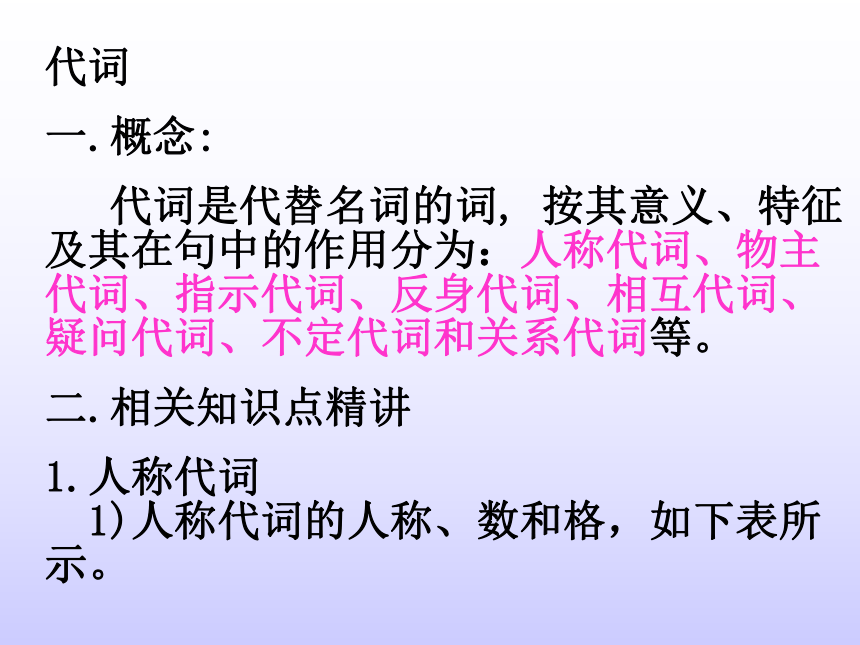
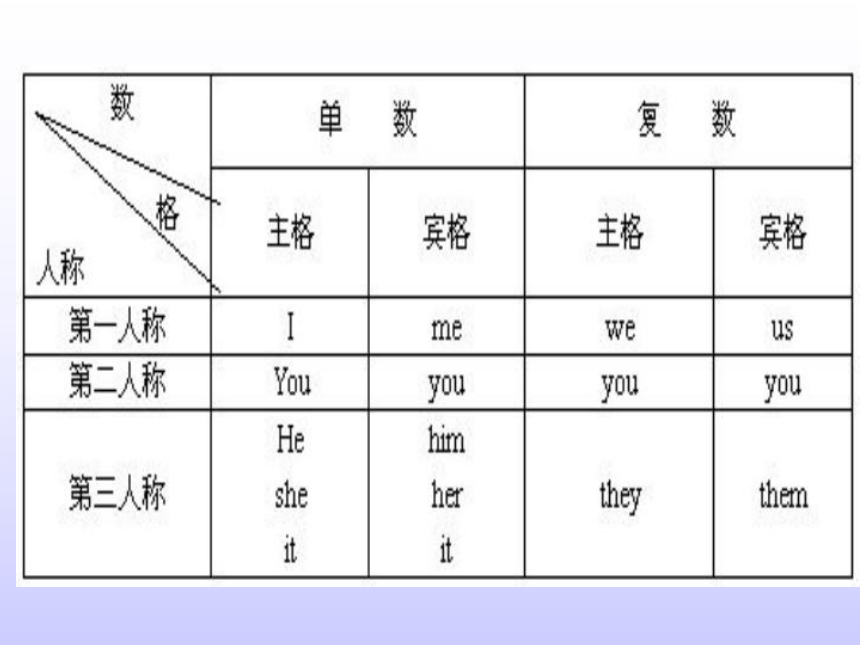
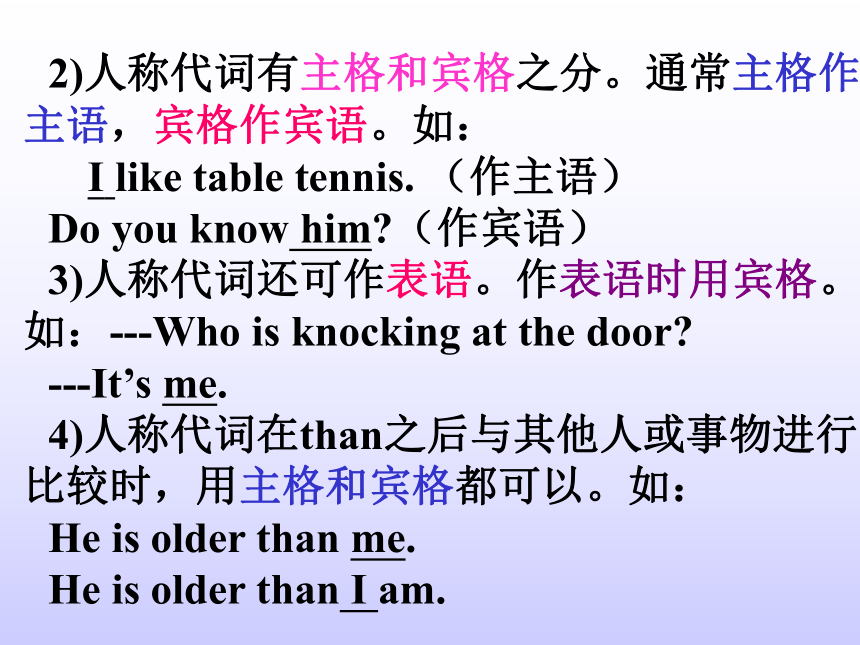
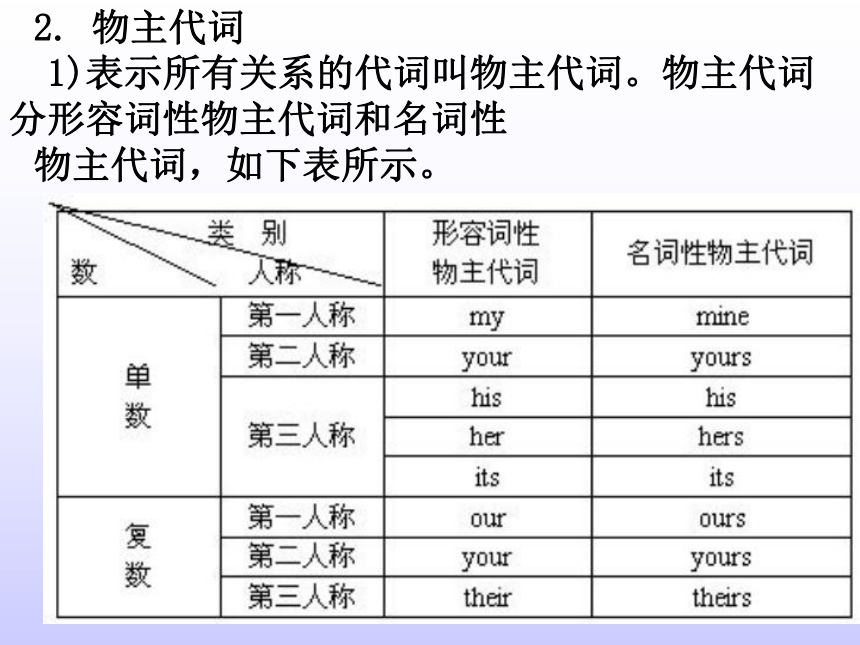
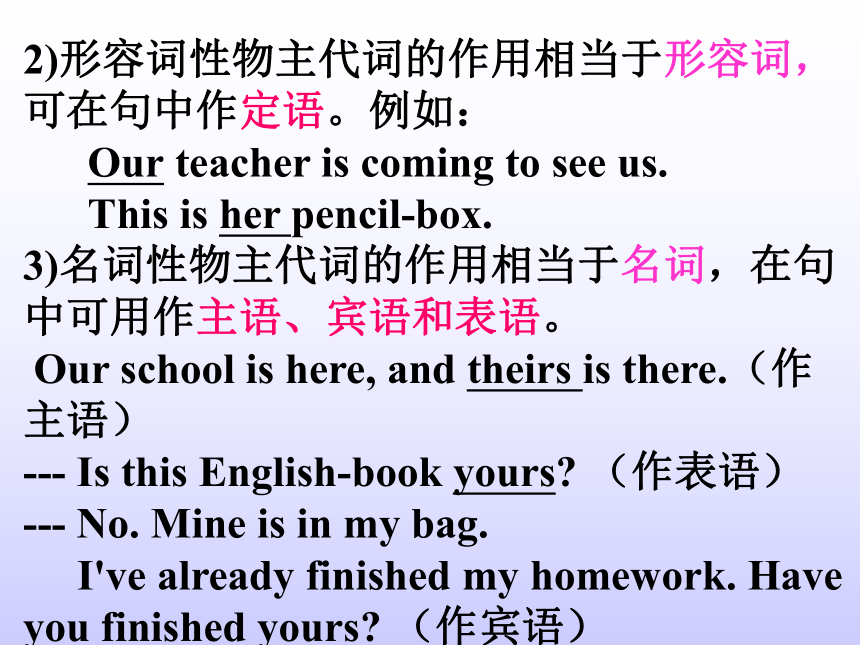
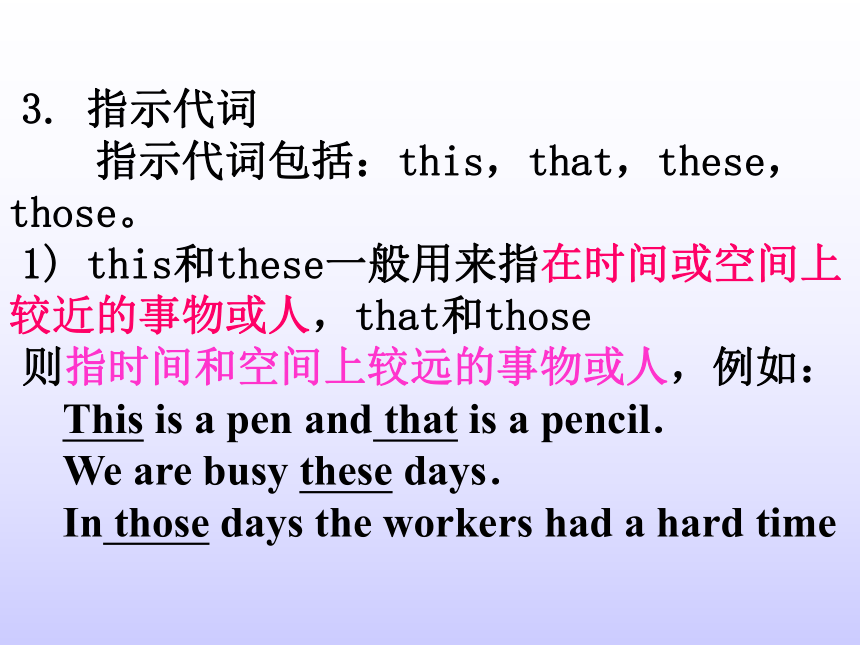
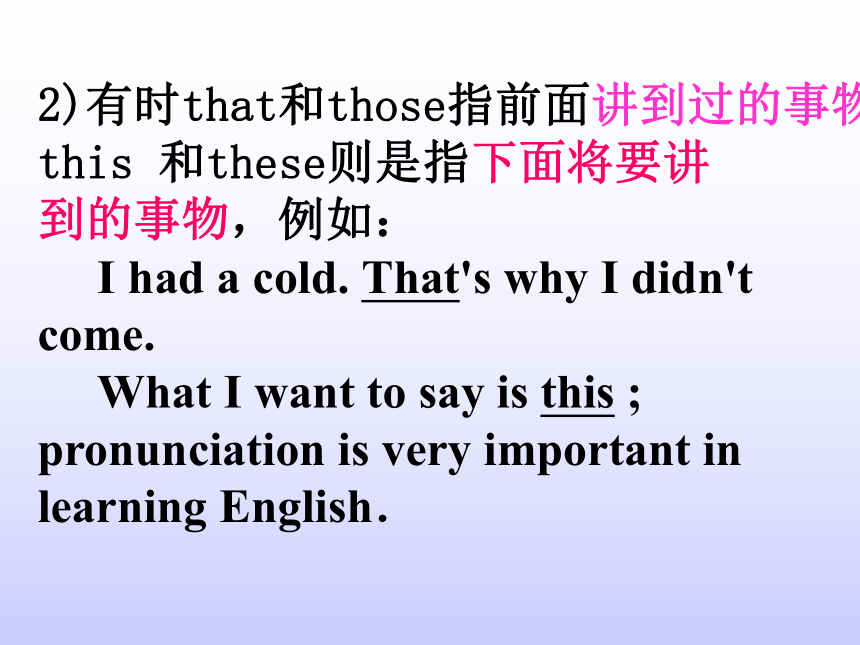
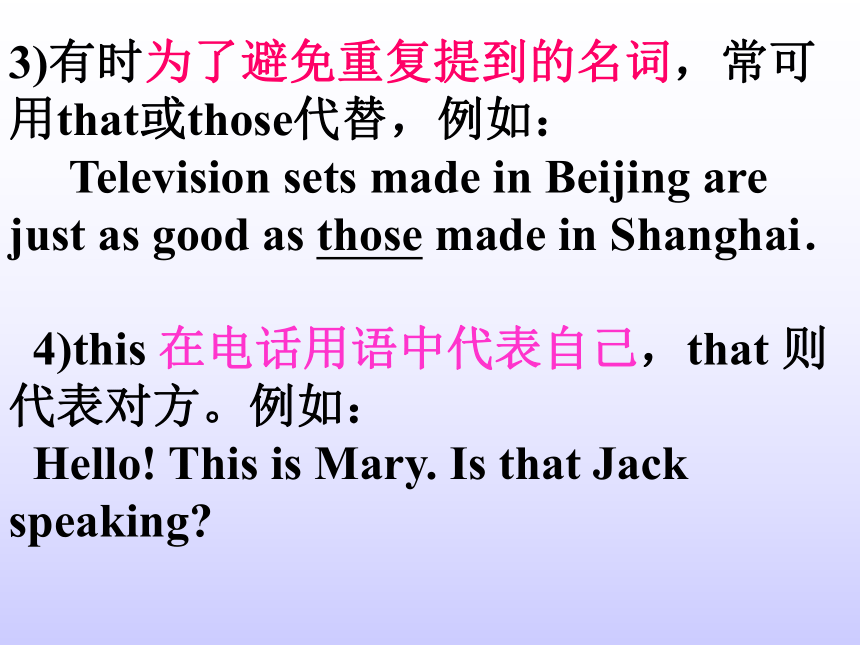
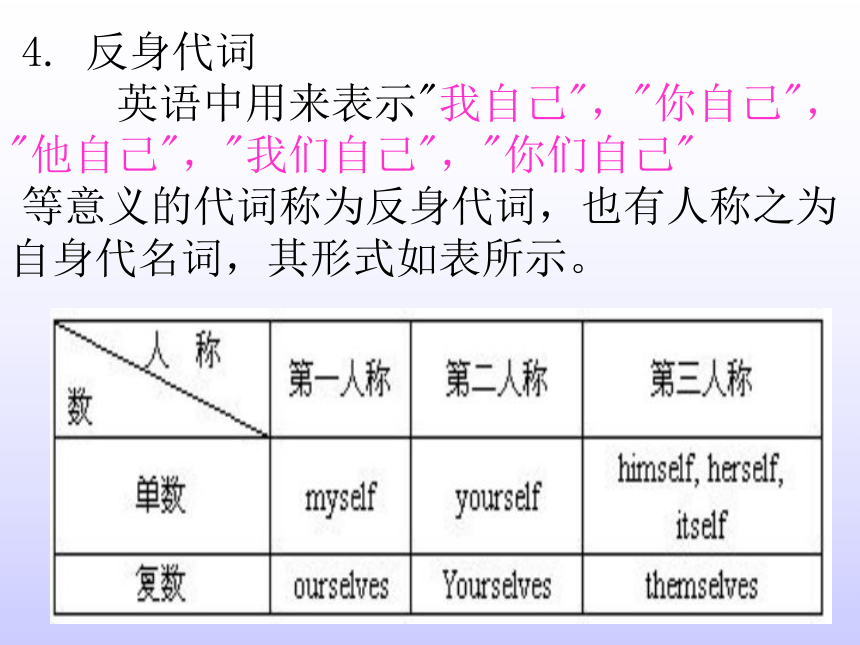
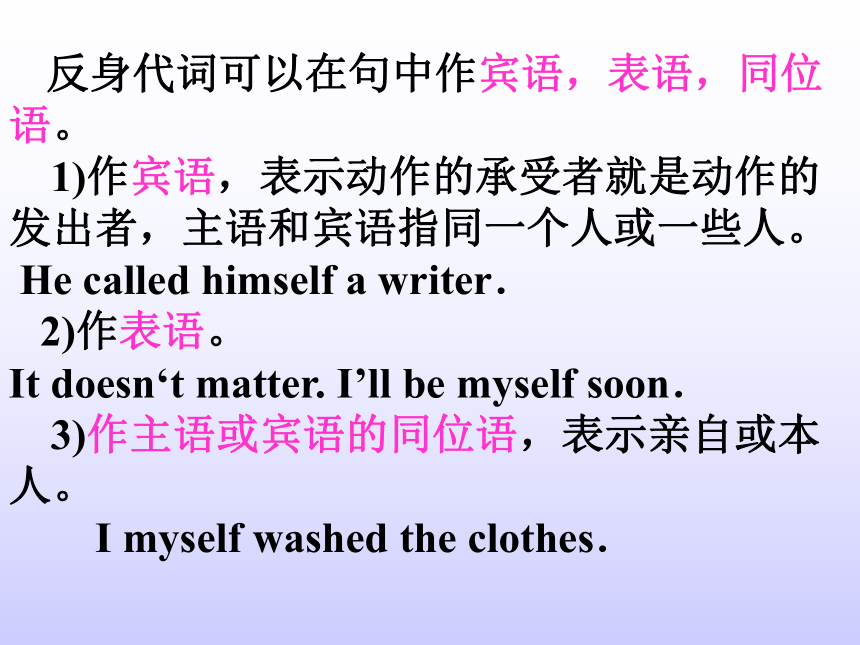
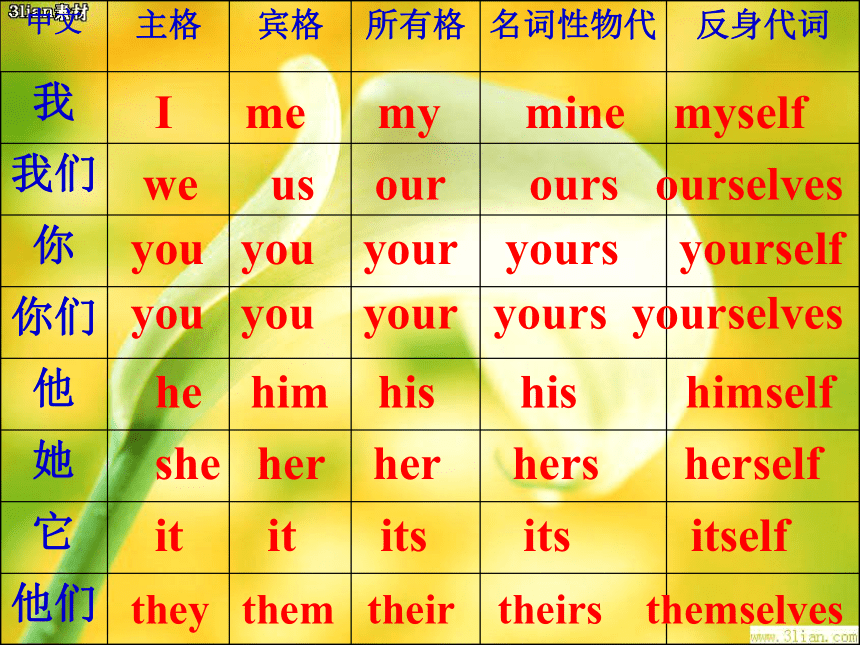
文档简介
课件39张PPT。Pronouns 代词
一.概念:
代词是代替名词的词, 按其意义、特征及其在句中的作用分为:人称代词、物主代词、指示代词、反身代词、相互代词、疑问代词、不定代词和关系代词等。
二.相关知识点精讲
1.人称代词 1)人称代词的人称、数和格,如下表所示。
2)人称代词有主格和宾格之分。通常主格作主语,宾格作宾语。如: I like table tennis. (作主语)
Do you know him?(作宾语)
3)人称代词还可作表语。作表语时用宾格。如:---Who is knocking at the door?
---It’s me.
4)人称代词在than之后与其他人或事物进行比较时,用主格和宾格都可以。如:
He is older than me.
He is older than I am. 2. 物主代词 1)表示所有关系的代词叫物主代词。物主代词分形容词性物主代词和名词性
物主代词,如下表所示。
?
2)形容词性物主代词的作用相当于形容词,可在句中作定语。例如: Our teacher is coming to see us. This is her pencil-box.
3)名词性物主代词的作用相当于名词,在句中可用作主语、宾语和表语。 Our school is here, and theirs is there.(作主语) --- Is this English-book yours? (作表语)
--- No. Mine is in my bag. I've already finished my homework. Have you finished yours? (作宾语) 3. 指示代词 指示代词包括:this,that,these,those。
1) this和these一般用来指在时间或空间上较近的事物或人,that和those
则指时间和空间上较远的事物或人,例如: This is a pen and that is a pencil. We are busy these days. In those days the workers had a hard time 2)有时that和those指前面讲到过的事物,this 和these则是指下面将要讲
到的事物,例如: I had a cold. That's why I didn't come. What I want to say is this ; pronunciation is very important in learning English. 3)有时为了避免重复提到的名词,常可用that或those代替,例如: Television sets made in Beijing are just as good as those made in Shanghai.
4)this 在电话用语中代表自己,that 则代表对方。例如:
Hello! This is Mary. Is that Jack speaking? 4. 反身代词 英语中用来表示"我自己","你自己","他自己","我们自己","你们自己"
等意义的代词称为反身代词,也有人称之为自身代名词,其形式如表所示。
反身代词可以在句中作宾语,表语,同位语。
1)作宾语,表示动作的承受者就是动作的发出者,主语和宾语指同一个人或一些人。 He called himself a writer.
2)作表语。 It doesn‘t matter. I’ll be myself soon.
3)作主语或宾语的同位语,表示亲自或本人。 I myself washed the clothes. I me my mine myself we us our ours ourselvesyou you your yours yourselfyou you your yours yourselves he him his his himself she her her hers herself it it its its itselfthey them their theirs themselves 5.不定代词:
(1)some与any:some一般用于肯定句中,但在表示请求并希望对方能给予肯定回答时,可用于疑问句中;any一般用于否定和疑问句中,但当any强调“任何”时,也可用于肯定句中。同理,something,somebody,someone的用法同some;anything,anybody,anyone的用法同any。
(2)none既可指人又可指物,其后面一般需跟of所引导的一个范围;no one只能指人,并且不需接范围。How many/much提问时的否定回答用none;Who提问时的否定回答用no one;What提问时的否定回答用nothing。 (3)another指三者或三者以上当中的另一个;the other指两者当中的另一个,也可接名词复数,特指其它某些人或物;any指三者或三者以上当中的任意一个。
(4)other意思是“其他的”,不能单独使用,后面必须接名词,表泛指;others可指
其他的人或东西,相当于other+名词复数;the others特指其他某些人或物,相当于the other+名词复数。
(5)either指两者中的任意一个,表示肯定;neither表示否定,指两者都不;nor表示否定,指三者或三者以上都不。 neither/nor的其它用法:neither一般只能作代词,而nor既可作代词又可作连词,连接两个否定意义的句子时,一般用nor,若用neither,则需在neither前加and。neither/nor位于句首时,句子须部分倒装。
(6)such指具体的人或事;SO只能用在某些动词后面,指情况或内容。
(附:其它词性的用法)
such a/an+ adj + n,.
so +adj +a/an +n.
such +adj +n.(pl或不可数名词)
so +many/much/few/little +n.(pl.n或不可数名词)
(7)every不能单独使用,必须与名词一起使用,强调全部、所有;each可单独使用,也可修饰名词,强调单个的个体。
(8)one可指人也可指物(可数),表示某一类人或东西中的一个,相当于a +n.,而it只能指物,强调同类同物(相当于the+n.)或不可数名词;one还可有复数形式ones,当one有定语修饰时,前面还可有冠词a/the+adj.+one。
(9)all指三者或三者以上“所有,全部”,而both指“两者都”,常与and连用,成为both...and。
(10)对含有all,both,every,each等词的句子进行否定时,不管not位于什么地方,句子所表达的否定都为部分否定。
6.相互代词:each other用于两者或两者以上;one another用于三者或三者以上,在现代英语中它们可通用。
7.疑问代词:what指事或物,不强调范围;who(whom,whose)指人;which既可指人也可指物,但强调范围。 8.连接代词:what,who,whom,whose,which(见从句一节)。
9.关系代词:what,who,whom,whose,which,that,as,but在解答代词类题目时,我们应首先分析题干,明确代词所指代的对象,从而避免误判。具体说来,可从这几个方面考虑:1.代词指代的是人还是物。2. 代词指代的是可数名词还是不可数名词。3. 代词指代的是特指还是泛指概念。4. 代词指代的概念是表示两者之间还是三者或三者以上。5.代词所表示的是肯定还是否定概念。三.巩固练习
1. Tom, Please pass ________ the glasses. I want to read the newspapers.
A. you B. me C. him D. her
2. The English novel is quite easy for you. There are ______ new words in it.
A. a little B. little C. a few D. few
3. ---You want ________ sandwich?
---Yes, I usually eat a lot when I’m hungry.
A. other B. another C. others D. the other
4. The doctors and nurses are doing their best to fight SARS. They think more of others than _______.
A. they B. them C. themselves D. theirs
5. ---Which do you prefer, a bottle of orange or a bottle of milk?
---__________, thanks. I’d like a cup of tea.
A. Either B. Neither C. Both D. None
6. ---Oh! I came in a hurry and forgot
to bring food.
---Never mind. You can have ________.
A. us B. ours C. you D. yours
7. ---Can I come this evening or
tomorrow morning?
---_______ is OK. I’m free today
and tomorrow.
A. Either B. Neither C. Both D. None 8. ---How are you going to improve _______ this term?
---Work harder than last term.
A. ourselves B. myself C. himself D. yourself
9. ---Could you tell me _______ she is looking for?
---Her cousin, Susan.
A. that B. whose C. who D. which10. ---Is _______ here?
---No. Li Lei and Han Mei have asked for leave. A. everybody B. somebody C. anybody D. nobody
11. Paul has _______ friends except me, and sometimes he feels lonely.
A. many B. some C. few D. more
12. If you want to book a round-trip ticket, you’ll have to pay ______ $ 30.
A. more B. other C. the other D. another13. ---Do you live by yourself, Mr Wang? ---Yes. I have two sons. But ______ of them lives with me. They are now studying in America? A. neither B. both C. none D. either
14. ---Have you sent your parents an E-mail telling them you arrived safe? ---No. _______ of them can use a computer.
A. None B. Both C. Neither D. All
15. Who taught _______ English last term? Was _____ Mr. Smith?
A. you; it B. you; he C. your; it D. your; that
16. ---That woman has a bag in her right hand. What’s in her _____ hand?
A. another B. other C. one D. the other
17. We decided to go for a field trip with some friends of _______.
A. us B. our C. ours D. ourselves
18. ---Is there a bus to the zoo?
---I’m afraid there’s _______ bus to the zoo.
A. no B. any C. some D. none
19. You forgot your dictionary? You may have _______.
A. me B. my C. mine D. myself
20. This is ______ classroom. Where is _______?
A.our; them B. us; they C. our; theirs D. ours; theirs enjoy oneself, feel oneself, make oneself at home, make oneself understood for oneself为自己或独立地,
of oneself自然地,自动地 by oneself独自地,
in oneself本身性质,
beside oneself喜怒哀愁至极 反身代词 相互代词 each other指两者之间,
one another指三者或三者以上之间
但现在区分已不明显。 That & those为了避免重复,常用that或those代替前面已提过的名词。 The weather of Beijing is colder than that of Nanjing. The ears of a rabbit are longer than those of a fox. some与any 一般用法:some、any可与单、复数可数名词及不可数名词连有。some一般用于肯定句,any多用于疑问、否定或条件句。
特殊用法:①any用于肯定句表示“任何”的意思。 Any day is okay for me. ②some用于单数可数名词前表示“某一”。 Smith went to some place in England.(定语) ③在期待对方回答yes 时,some用在表示请求或邀请的问句中。 Would you like some bananas?(邀请) Mum,could you give me some money?(请求) ④some 用于否定句表示部分否定。 I don’t know some of the students.(宾语) some和any在句中还可作状语,作副词。some意为“大约”相当于“about”,而any则表示程度,意为“稍,丝毫”。如: There are some 300 workers on strike. Do you feel any better today? one,both,all one指人或物,“一个”,其复数为ones,指人时,其所有格是one’s,反身代词是oneself. This is not the one I want.(表语) both指人或指物,“两者都” This maths problem can be worked out in both ways.(定语) 注意:both用于否定句,表示部分否定;表示完全否定时,用neither。Both of us are not teachers.我们俩并不都是教师。 Neither of us is a teacher. 我们俩都不是教师。 both不能放在the、these、those、my等之后,而应放在它们的前面。如:Both my parents like this film.
All “全部的”、“整个的”,可与可数或不可数名词连用,除少数情况外,一般不与单数可数名词连用,与复数名词连用时,表示“所有的”、“全部的”,指三个或三个以上的人或物。 He gave me all the money.他把全部的钱给了我。 All the schools are flooded.所有的学校都被淹了。 注意:all 用于否定句,表示部分否定,完全否定用none。如: Not all the ants go out for food.(or:All the ants don’t go out for food.)并不是所有的蚂蚁都出去寻找食物。 None of the money is mine.这钱一分也不是我的。 many和much few, little; a few, a little few和little表示没有多少,含否定意义;而a few 和a little表示有一些,有几个,含肯定意义。另外,few、a few 修饰可数名词;little、a little修饰不可数名词。它们在句中常用作定语、主语和宾语。no和none no=not any,表示“没有”,用来修饰可数名词或不可数名词,通常作定语,none代替不可数名词作主语时,谓语动词用单数形式;代替可数名词作主语时,谓语动词可用单数也可用复数形式。none还可以在句中作宾语。 注意:none既可以指人又可以指物,no one只能指人。 each和every each(各个),指两个或两个以上的人或物,侧重个体,在句中作主语、宾语、定语和同位语。every(每个),指三个或三个以上的人或物,侧重整体,在句中只能作定语。 Every student it our class has a dictionary.(定语,强调班上“所有的人”) Each student in our class has a dictionary.(定语,强调各个个体) Each of them has been there.(主语) The teacher gave each of the students a new textbook.(宾语) We each got a ticket.(同位语) either和neither either是“两者中任何一个”的意思,可修饰或代替单数可数名词,neither是“两者中没有一个”的意思,可以修饰或代替单数可数名词,它们可在句在作主语、宾语或定语。如: Here are two pens. You may take either of them.(宾语) Neither boy knows French.(定语) other和another, the others 和others the other表示“两者中的另一个”;“the other + 复数可数名词” 表示“其余(他)的……”;the others表示“其他的人或物”。“others及other + 复数名词”泛指“其他的(别的)人或物”。这些词语在句中可作主语、宾语和定语。如: He got two books; one is textbook, the other is a novel. Five of the pencils are red, the others(the other pens)are yellow. Some are singing, others are dancing. another修饰或代替单数可数名词,意为“(三个或三个以上的)另一个”,不能指两者中的另一个,在句中可作宾语和定语。 This coat is too dark. Please show me another.(宾语) Please give me another book.(定语) 注意:another修饰复数名词时,意为“再,又”。如:Please give me another ten minutes. one … another(a second)… a third…the other…意为“一个……一个……一个……一个”用于三者或三者以上的排列。some…others…others…,意为“一些……一些……一些”。
一.概念:
代词是代替名词的词, 按其意义、特征及其在句中的作用分为:人称代词、物主代词、指示代词、反身代词、相互代词、疑问代词、不定代词和关系代词等。
二.相关知识点精讲
1.人称代词 1)人称代词的人称、数和格,如下表所示。
2)人称代词有主格和宾格之分。通常主格作主语,宾格作宾语。如: I like table tennis. (作主语)
Do you know him?(作宾语)
3)人称代词还可作表语。作表语时用宾格。如:---Who is knocking at the door?
---It’s me.
4)人称代词在than之后与其他人或事物进行比较时,用主格和宾格都可以。如:
He is older than me.
He is older than I am. 2. 物主代词 1)表示所有关系的代词叫物主代词。物主代词分形容词性物主代词和名词性
物主代词,如下表所示。
?
2)形容词性物主代词的作用相当于形容词,可在句中作定语。例如: Our teacher is coming to see us. This is her pencil-box.
3)名词性物主代词的作用相当于名词,在句中可用作主语、宾语和表语。 Our school is here, and theirs is there.(作主语) --- Is this English-book yours? (作表语)
--- No. Mine is in my bag. I've already finished my homework. Have you finished yours? (作宾语) 3. 指示代词 指示代词包括:this,that,these,those。
1) this和these一般用来指在时间或空间上较近的事物或人,that和those
则指时间和空间上较远的事物或人,例如: This is a pen and that is a pencil. We are busy these days. In those days the workers had a hard time 2)有时that和those指前面讲到过的事物,this 和these则是指下面将要讲
到的事物,例如: I had a cold. That's why I didn't come. What I want to say is this ; pronunciation is very important in learning English. 3)有时为了避免重复提到的名词,常可用that或those代替,例如: Television sets made in Beijing are just as good as those made in Shanghai.
4)this 在电话用语中代表自己,that 则代表对方。例如:
Hello! This is Mary. Is that Jack speaking? 4. 反身代词 英语中用来表示"我自己","你自己","他自己","我们自己","你们自己"
等意义的代词称为反身代词,也有人称之为自身代名词,其形式如表所示。
反身代词可以在句中作宾语,表语,同位语。
1)作宾语,表示动作的承受者就是动作的发出者,主语和宾语指同一个人或一些人。 He called himself a writer.
2)作表语。 It doesn‘t matter. I’ll be myself soon.
3)作主语或宾语的同位语,表示亲自或本人。 I myself washed the clothes. I me my mine myself we us our ours ourselvesyou you your yours yourselfyou you your yours yourselves he him his his himself she her her hers herself it it its its itselfthey them their theirs themselves 5.不定代词:
(1)some与any:some一般用于肯定句中,但在表示请求并希望对方能给予肯定回答时,可用于疑问句中;any一般用于否定和疑问句中,但当any强调“任何”时,也可用于肯定句中。同理,something,somebody,someone的用法同some;anything,anybody,anyone的用法同any。
(2)none既可指人又可指物,其后面一般需跟of所引导的一个范围;no one只能指人,并且不需接范围。How many/much提问时的否定回答用none;Who提问时的否定回答用no one;What提问时的否定回答用nothing。 (3)another指三者或三者以上当中的另一个;the other指两者当中的另一个,也可接名词复数,特指其它某些人或物;any指三者或三者以上当中的任意一个。
(4)other意思是“其他的”,不能单独使用,后面必须接名词,表泛指;others可指
其他的人或东西,相当于other+名词复数;the others特指其他某些人或物,相当于the other+名词复数。
(5)either指两者中的任意一个,表示肯定;neither表示否定,指两者都不;nor表示否定,指三者或三者以上都不。 neither/nor的其它用法:neither一般只能作代词,而nor既可作代词又可作连词,连接两个否定意义的句子时,一般用nor,若用neither,则需在neither前加and。neither/nor位于句首时,句子须部分倒装。
(6)such指具体的人或事;SO只能用在某些动词后面,指情况或内容。
(附:其它词性的用法)
such a/an+ adj + n,.
so +adj +a/an +n.
such +adj +n.(pl或不可数名词)
so +many/much/few/little +n.(pl.n或不可数名词)
(7)every不能单独使用,必须与名词一起使用,强调全部、所有;each可单独使用,也可修饰名词,强调单个的个体。
(8)one可指人也可指物(可数),表示某一类人或东西中的一个,相当于a +n.,而it只能指物,强调同类同物(相当于the+n.)或不可数名词;one还可有复数形式ones,当one有定语修饰时,前面还可有冠词a/the+adj.+one。
(9)all指三者或三者以上“所有,全部”,而both指“两者都”,常与and连用,成为both...and。
(10)对含有all,both,every,each等词的句子进行否定时,不管not位于什么地方,句子所表达的否定都为部分否定。
6.相互代词:each other用于两者或两者以上;one another用于三者或三者以上,在现代英语中它们可通用。
7.疑问代词:what指事或物,不强调范围;who(whom,whose)指人;which既可指人也可指物,但强调范围。 8.连接代词:what,who,whom,whose,which(见从句一节)。
9.关系代词:what,who,whom,whose,which,that,as,but在解答代词类题目时,我们应首先分析题干,明确代词所指代的对象,从而避免误判。具体说来,可从这几个方面考虑:1.代词指代的是人还是物。2. 代词指代的是可数名词还是不可数名词。3. 代词指代的是特指还是泛指概念。4. 代词指代的概念是表示两者之间还是三者或三者以上。5.代词所表示的是肯定还是否定概念。三.巩固练习
1. Tom, Please pass ________ the glasses. I want to read the newspapers.
A. you B. me C. him D. her
2. The English novel is quite easy for you. There are ______ new words in it.
A. a little B. little C. a few D. few
3. ---You want ________ sandwich?
---Yes, I usually eat a lot when I’m hungry.
A. other B. another C. others D. the other
4. The doctors and nurses are doing their best to fight SARS. They think more of others than _______.
A. they B. them C. themselves D. theirs
5. ---Which do you prefer, a bottle of orange or a bottle of milk?
---__________, thanks. I’d like a cup of tea.
A. Either B. Neither C. Both D. None
6. ---Oh! I came in a hurry and forgot
to bring food.
---Never mind. You can have ________.
A. us B. ours C. you D. yours
7. ---Can I come this evening or
tomorrow morning?
---_______ is OK. I’m free today
and tomorrow.
A. Either B. Neither C. Both D. None 8. ---How are you going to improve _______ this term?
---Work harder than last term.
A. ourselves B. myself C. himself D. yourself
9. ---Could you tell me _______ she is looking for?
---Her cousin, Susan.
A. that B. whose C. who D. which10. ---Is _______ here?
---No. Li Lei and Han Mei have asked for leave. A. everybody B. somebody C. anybody D. nobody
11. Paul has _______ friends except me, and sometimes he feels lonely.
A. many B. some C. few D. more
12. If you want to book a round-trip ticket, you’ll have to pay ______ $ 30.
A. more B. other C. the other D. another13. ---Do you live by yourself, Mr Wang? ---Yes. I have two sons. But ______ of them lives with me. They are now studying in America? A. neither B. both C. none D. either
14. ---Have you sent your parents an E-mail telling them you arrived safe? ---No. _______ of them can use a computer.
A. None B. Both C. Neither D. All
15. Who taught _______ English last term? Was _____ Mr. Smith?
A. you; it B. you; he C. your; it D. your; that
16. ---That woman has a bag in her right hand. What’s in her _____ hand?
A. another B. other C. one D. the other
17. We decided to go for a field trip with some friends of _______.
A. us B. our C. ours D. ourselves
18. ---Is there a bus to the zoo?
---I’m afraid there’s _______ bus to the zoo.
A. no B. any C. some D. none
19. You forgot your dictionary? You may have _______.
A. me B. my C. mine D. myself
20. This is ______ classroom. Where is _______?
A.our; them B. us; they C. our; theirs D. ours; theirs enjoy oneself, feel oneself, make oneself at home, make oneself understood for oneself为自己或独立地,
of oneself自然地,自动地 by oneself独自地,
in oneself本身性质,
beside oneself喜怒哀愁至极 反身代词 相互代词 each other指两者之间,
one another指三者或三者以上之间
但现在区分已不明显。 That & those为了避免重复,常用that或those代替前面已提过的名词。 The weather of Beijing is colder than that of Nanjing. The ears of a rabbit are longer than those of a fox. some与any 一般用法:some、any可与单、复数可数名词及不可数名词连有。some一般用于肯定句,any多用于疑问、否定或条件句。
特殊用法:①any用于肯定句表示“任何”的意思。 Any day is okay for me. ②some用于单数可数名词前表示“某一”。 Smith went to some place in England.(定语) ③在期待对方回答yes 时,some用在表示请求或邀请的问句中。 Would you like some bananas?(邀请) Mum,could you give me some money?(请求) ④some 用于否定句表示部分否定。 I don’t know some of the students.(宾语) some和any在句中还可作状语,作副词。some意为“大约”相当于“about”,而any则表示程度,意为“稍,丝毫”。如: There are some 300 workers on strike. Do you feel any better today? one,both,all one指人或物,“一个”,其复数为ones,指人时,其所有格是one’s,反身代词是oneself. This is not the one I want.(表语) both指人或指物,“两者都” This maths problem can be worked out in both ways.(定语) 注意:both用于否定句,表示部分否定;表示完全否定时,用neither。Both of us are not teachers.我们俩并不都是教师。 Neither of us is a teacher. 我们俩都不是教师。 both不能放在the、these、those、my等之后,而应放在它们的前面。如:Both my parents like this film.
All “全部的”、“整个的”,可与可数或不可数名词连用,除少数情况外,一般不与单数可数名词连用,与复数名词连用时,表示“所有的”、“全部的”,指三个或三个以上的人或物。 He gave me all the money.他把全部的钱给了我。 All the schools are flooded.所有的学校都被淹了。 注意:all 用于否定句,表示部分否定,完全否定用none。如: Not all the ants go out for food.(or:All the ants don’t go out for food.)并不是所有的蚂蚁都出去寻找食物。 None of the money is mine.这钱一分也不是我的。 many和much few, little; a few, a little few和little表示没有多少,含否定意义;而a few 和a little表示有一些,有几个,含肯定意义。另外,few、a few 修饰可数名词;little、a little修饰不可数名词。它们在句中常用作定语、主语和宾语。no和none no=not any,表示“没有”,用来修饰可数名词或不可数名词,通常作定语,none代替不可数名词作主语时,谓语动词用单数形式;代替可数名词作主语时,谓语动词可用单数也可用复数形式。none还可以在句中作宾语。 注意:none既可以指人又可以指物,no one只能指人。 each和every each(各个),指两个或两个以上的人或物,侧重个体,在句中作主语、宾语、定语和同位语。every(每个),指三个或三个以上的人或物,侧重整体,在句中只能作定语。 Every student it our class has a dictionary.(定语,强调班上“所有的人”) Each student in our class has a dictionary.(定语,强调各个个体) Each of them has been there.(主语) The teacher gave each of the students a new textbook.(宾语) We each got a ticket.(同位语) either和neither either是“两者中任何一个”的意思,可修饰或代替单数可数名词,neither是“两者中没有一个”的意思,可以修饰或代替单数可数名词,它们可在句在作主语、宾语或定语。如: Here are two pens. You may take either of them.(宾语) Neither boy knows French.(定语) other和another, the others 和others the other表示“两者中的另一个”;“the other + 复数可数名词” 表示“其余(他)的……”;the others表示“其他的人或物”。“others及other + 复数名词”泛指“其他的(别的)人或物”。这些词语在句中可作主语、宾语和定语。如: He got two books; one is textbook, the other is a novel. Five of the pencils are red, the others(the other pens)are yellow. Some are singing, others are dancing. another修饰或代替单数可数名词,意为“(三个或三个以上的)另一个”,不能指两者中的另一个,在句中可作宾语和定语。 This coat is too dark. Please show me another.(宾语) Please give me another book.(定语) 注意:another修饰复数名词时,意为“再,又”。如:Please give me another ten minutes. one … another(a second)… a third…the other…意为“一个……一个……一个……一个”用于三者或三者以上的排列。some…others…others…,意为“一些……一些……一些”。
